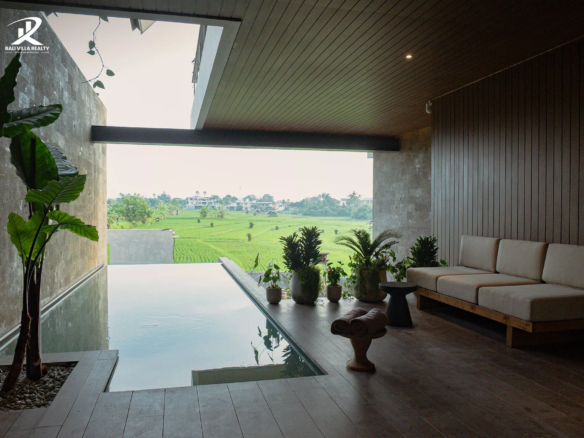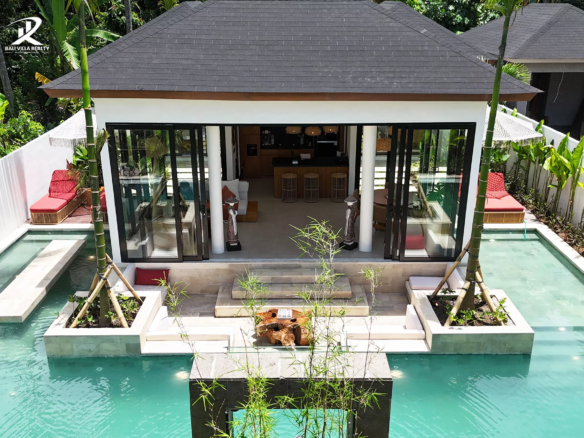Southeast Asia remains a top choice for real estate investors, thanks to its rich culture, beautiful scenery, and booming tourism industry. For 2025, Bali and Thailand emerge as leading destinations.
Both places are offering a unique combination of lifestyle advantages, investment opportunities, and cultural richness that attract international investors. However, the question remains: which is the best choice for your property investment?
This article will dive deeper into the subject, and provide the key information you need when considering real estate investments in Southeast Asia.
Key Takeaways
| Factor | Bali | Thailand |
|---|---|---|
| Tourism (2024) - Numbers of international visitors | 6.3 million | 34.5 million |
| Target Audience | Digital nomads Wellness seekers Premium travelers Retirees | Expats Retirees Budget-conscious tourists |
| Economic Growth (2024) | 5.48% | 2.5% |
| Rental Yields | 7–15% for short-term rentals; 8–15% for long-term stays | 5–8% for both short-term and long-term rentals |
| Payback Period | As fast as 5-6 years | 8-12 years |
| Property Prices | Generally higher, with villas starting from $150,000+ | More affordable, with condos starting from $50,000+ |
| Legal Framework | Leasehold or a PT PMA company | Condo ownership or leasehold |
| Tourism Season | Year-round destination with steady demand | Seasonal tourism, peaking from November to March |

Invest in Bali: Overview
1. Bali Real Estate Market

We will first look at the Bali market condition and opportunities:
- Bali Economic Growth: Bali’s economy grew 5.52% in the first quarter of 2025 compared to last year. Tourism is also rising, with 591,221 foreign visitors in April—up 25.56% from March’s 470,851.
- High Rental Yields (Long-Term Rental): Due to Bali's developing tourist industry, there is a high demand for rental homes. Long-term rentals (in hotspots) may provide stable cash flow with yields of 8-15%.
- Short-Term Rental Demand: Short-term rentals enjoy occupancy rates of 80-90% and generate gross yields between 7-15%. Premium oceanfront villas (like villas in Jimbaran) can deliver even higher daily returns, reaching 12-20%.
- Payback Period: ROI coming in as fast as 5-6 years.
2. Benefits of Investing in Bali
Furthermore, there are many other benefits if you invest in Bali, Indonesia:
- Reasonably priced real estate: Bali has comparatively cheap real estate as compared to other international centres, which makes it easier for investors to get funds.
- Accessible Investment Pathways: International investors may purchase real estate more easily in Bali because of its accessible investment structures, which include foreign-owned businesses and leasehold rights.
- Beneficial Tax Laws: Indonesia has very cheap land and property taxes, which increases the return on an investment in Bali real estate.
- Robust Tourism & Lifestyle: Bali's thriving tourism, cultural diversity, and alluring way of life generate steady demand for real estate and provide advantages for individual lifestyles.
3. Legal Considerations
Foreigners are not permitted to directly hold freehold property titles in Indonesia, but there are flexible alternatives available in Bali:
- Leasehold Ownership: Typically offered for 20–30 years and renewable, this option is popular among investors because it’s flexible and more affordable upfront.
- PT PMA Structure: By establishing a foreign-owned company (PT PMA), investors can obtain freehold rights for up to 90 years, making it a strong choice for those seeking long-term ownership opportunities.
4. The Downsides of Bali
- Operational Costs: Managing short-term rentals can be expensive, with fees ranging from 35–55% of total income (though these are often balanced by higher nightly rates).
- Legal Requirements: Setting up a leasehold or PT PMA structure involves complex legal steps, so professional guidance is essential to prevent issues later on.
- Market Competition: Bali's top areas such as Canggu and Seminyak are highly competitive. You'll need to make a distinctive and very well-designed villas to attract strong demand.

Get a Customized Investment Plan in Bali
With over 15+ years in the market, here’s what we can do for you:
- Find the best location to invest in Bali.
- Reliable guidance on Bali’s property market and laws.
- Personalized strategy to maximize returns and meet your financial goals.
Invest in Thailand: Overview
1. Thailand Real Estate Market

Meanwhile, Thailand offers the following conditions and opportunities for real estate investment:
- Thailand Economic Growth: Thailand continues to benefit from a strong tourism rebound, welcoming over 35 million international visitors in 2024. The country’s economy grew by approximately 2.5% that same year.
- Lower Property Prices: Property in Thailand is more affordable than in Bali. Condos in Phuket or Bangkok start from $50,000–$100,000, compared to Bali villas from $150,000+. Average yields reach 5–8%, with lower upkeep costs.
- Multiple Long-Stay Visa Options: Thailand offers several long-stay visa options—such as the Privilege Visa, Long-Term Resident Visa, and Destination Thailand Visa—making long-term stays easier with added tax benefits. Popular areas include Hua Hin, Koh Samui, and Phuket.
- Payback Period: The typical payback period for property investments in Thailand falls between 8 and 12 years.
2. Benefits of Investing in Thailand
Now for the benefits that come with investing in Thailand:
- Investor-Friendly regulations: Thailand provides investors with advantageous regulations that lower barriers to investment, such as cheap transaction costs and no capital gains tax on individual sales.
- Options for Long-Term Residency: A number of long-stay visa programs, such as the 10-year Long-Term Resident Visa, offer simpler paths to tax advantages and long-term residency.
- Stable Economy & Legal Protection: For international investors, Thailand offers a safe and open environment thanks to its stable economy and strong private property rights protection.
- Strong tourist Recovery: The demand for rental homes and hospitality developments is still high due to a thriving tourist industry.
3. Legal Considerations
Thailand offers a simpler legal framework for foreigners:
- Condominium Ownership: Foreign buyers can legally own condominiums outright, up to 49% of a building’s total units (simpler process compared to Bali’s leasehold system).
- Villa Leasehold: Land and villa leases generally last 30 years and can be renewed. Freehold ownership is possible through the formation of a Thai company.
- Retirement Visas: Programs such as the Thailand Elite Visa attract long-term residents and retirees.
4. The Downsides of Thailand
- Lower Returns: Rental yields in Thailand average 5–8% (lower than Bali’s 7–15%) especially for short-term stays.
- Tourism Seasonality: Thailand’s tourism peaks between November and March, making rental income more seasonal (while Bali has a steady year-round demand).
- Slower Economic Growth: With a 2.5% GDP growth rate, Thailand lags behind Indonesia’s 5.71%, suggesting a slower pace of property value appreciation over time.
Read More: How to Retire in Bali as Foreigners: Pros, Cons, and Tips to Consider
Which One Is Better for You, Bali or Thailand?

You’ve seen how Bali and Thailand compare. Here’s what really matters when making your choice:
- Thailand is a great option for budget-friendly investors and those interested in condos with simpler ownership regulations.
- Bali, on the other hand, offers higher returns, stronger demand, and a more unique lifestyle—giving it an edge for long-term investors.
Why Bali outperforms Thailand for property investment:
- Higher Returns: Bali’s rental yields range from 7–15%, beating Thailand’s 5–8%. In hot spots like Canggu or Bukit, villas can achieve 12–20% daily yields with 80–90% occupancy rates.
- Year-Round Demand: Unlike Thailand’s seasonal market, Bali enjoys steady tourism all year, providing consistent rental income.
- Premium Appeal: Bali’s rich culture and tropical beauty attract high-spending travelers, including wellness tourists and digital nomads.
- Growth Potential: With Indonesia’s 5.71% GDP growth and Bali’s ongoing infrastructure development, the island offers stronger long-term appreciation compared to Thailand’s 2.5% growth.
Read More: How to Buy Property in Bali from Abroad: Complete Guide

Bonus: Tips for Investing in Bali

- Explore New Areas: Don’t just focus on busy zones like Canggu. Check out growing regions such as Uluwatu or Tabanan for better long-term value.
- Choose Standout Properties: Go for eco-friendly villas or homes with ocean views to attract higher-paying guests in a competitive market.
- Work with Local Professionals: Partner with trusted Bali property experts who can help you manage leasehold or PT PMA setups smoothly.
- Maximize Short-Term Rentals: List your villa on Airbnb or similar platforms to earn more, especially in areas popular with digital nomads and wellness travelers.
- Think Green: Investing in sustainable developments not only supports Bali’s eco-values but also attracts environmentally aware tenants and increases long-term property value.
Read More: Comparing Bali Top Investment Location (2025): Canggu, Seminyak, and Uluwatu
Conclusion: Start Your Bali Property Investment with Ease
It’s safe to say that Bali remains a stronger choice than Thailand for villa investment, offering steady returns and faster ROI paybacks. Many expats still choose the Island of the Gods for this reason.
If you believe Bali is the right place for your investment too, you’re already one step closer to a brighter future! Now, all you need is the right plan—and great news! You don’t have to figure it out alone.
Our experts at Bali Villa Realty are here to help you anytime. Book a free consultation to get clear answers and a personalized plan tailored to your goals—completely free, no strings attached.
Want to start investing in Bali property?
Have a quick chat with our real estate experts for personalized advice on your Bali investments. No commitment required.
FAQ
1. What month is the busiest in Bali?
The dry season, which runs from April to October, is the peak period for tourists visiting Bali.
2. Is Bali or Thailand cheaper?
For activities and attractions, Bali is usually a bit cheaper than Bangkok. Overall, both Bali and Thailand are affordable for most travelers.
3. Which is better for families, Bali or Thailand?
Bali has safe family beaches like Nusa Dua and Sanur, though many have strong waves. Thailand’s beaches are calmer overall, making them very family-friendly.











